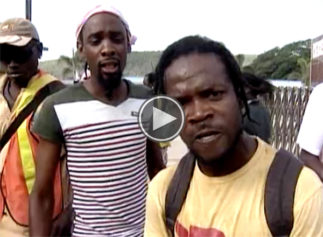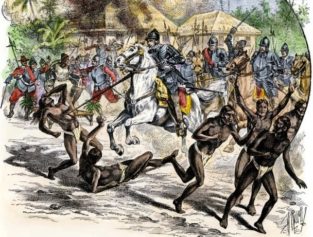Should Britain be forced to pay reparations to Jamaica to make amends for slavery? That is the question being explored by a new reparations commission that has been formed in Jamaica to study the viability of reparations.
The commission will have 2 1/2 years to do its work—receiving submissions, evaluating research and undertaking public consultations in order to make recommendations for a possible reparations claim, according to chairwoman Verene A. Shepherd, a historian who is director of the Institute for Gender and Development Studies at Jamaica’s University of the West Indies.
Shepherd’s panel, which started its work on Thursday, is made up of roughly a dozen academics, lawyers, Rastafarians and students. Jamaica tried this once before, forming a panel in 2009 that was disbanded a year later due to financial constraints.
Slavery was abolished in the former British colony of Jamaica on Aug, 1, 1834. An estimated tens of millions of African men, women and children were enslaved and shipped to the Caribbean and the Americas, with millions dying in holding camps in Africa or during the trans-Atlantic voyage.
The slave labor was able to dramatically enrich the slaveholders in the New World and in Britain. An estimated 600,000 of the Africans were shipped to the American colonies. Over the year, the reparations movement has also been pushed for the United States government to make a monetary payment or apologize for slavery.
Slavery on Jamaica’s sugar plantations was considered even more brutal than slavery in America.
Shepherd told the Associated Press that coming up with a financial estimate for reparations is critical to coming to terms with the lasting legacy of slavery in Jamaica and the rest of the Caribbean, even if a monetary payout never pans out.
“It’s not about saying that there has to be a financial settlement. But getting an estimate of the financial damage of slavery is important because it gives you an idea of the magnitude of this crime against humanity,” she said.
A financial estimate will also give an idea of “what will be necessary to fix these countries that have suffered,” Shepherd said.
According to Shepherd, the legacy of slavery has impaired Caribbean nations’ ability to advance and compete globally.
Reparation advocates have previously estimated the damages “owed” to descendants of African slaves in the trillions of U.S. dollars.
Commission member Anthony Gifford, a prominent British-Jamaican lawyer, said he hopes the Jamaican panel’s work will spur a combined reparations effort across the region. “I would like to see it approached on a Caribbean-wide basis,” he said.
Last year, Antigua Prime Minister Baldwin Spencer called for reparations at the United Nations.
A coalition of Rastafarians in 2004 said European countries formerly involved in the slave trade, especially Britain, should pay 72.5 billion British pounds to resettle 500,000 Jamaican Rastafarians in Africa. The British government rejected the claim, saying it could not be held accountable for wrongs in past centuries.
amaica has revived a reparations commission to research slavery’s social and economic impact and examine whether the predominantly black Caribbean island should seek compensation or a formal apology from Britain to heal old wounds, officials said Thursday.
The government-formed commission has about 2½ years to receive submissions, evaluate research and undertake public consultations in order to make recommendations for a possible reparations claim, said chairwoman Verene A. Shepherd, a historian who is director of the Institute for Gender and Development Studies at Jamaica’s University of the West Indies.
Shepherd said the work of the reconvened commission started Thursday. It is made up of roughly a dozen academics, lawyers, Rastafarians and students. A previous panel formed in 2009 was disbanded a year later due to financial constraints.
Jamaica is a former British colony where slavery was abolished on Aug. 1, 1834.
Although estimates vary, researchers say tens of millions of African men, women and children were enslaved and shipped to the Caribbean and the Americas, with millions dying in holding camps in Africa or during the trans-Atlantic voyage.
Historians say their labor alone made a vast difference to the economies of the New and Old World. In Jamaica, most slaves were forced to work under brutal conditions on sugar plantations.
Shepherd said that coming up with a financial estimate for reparations is critical to coming to terms with the lasting legacy of slavery in Jamaica and the rest of the Caribbean, even if a monetary payout never pans out.
“It’s not about saying that there has to be a financial settlement. But getting an estimate of the financial damage of slavery is important because it gives you an idea of the magnitude of this crime against humanity,” she said.
A financial estimate will also give an idea of “what will be necessary to fix these countries that have suffered,” Shepherd said. She said the legacy of slavery has impaired Caribbean nations’ ability to advance and compete globally.
Reparation advocates have previously estimated the damages “owed” to descendants of African slaves in the trillions of U.S. dollars.
Commission member Anthony Gifford, a prominent British-Jamaican lawyer, said he hopes the Jamaican panel’s work will spur a combined reparations effort across the region. “I would like to see it approached on a Caribbean-wide basis,” he said.
Last year, Antigua Prime Minister Baldwin Spencer called for reparations at the United Nations.
In 2004, a coalition of Rastafarian groups in Jamaica said European countries formerly involved in the slave trade, especially Britain, should pay 72.5 billion British pounds to resettle 500,000 Jamaican Rastafarians in Africa. The British government rejected the claim, saying it could not be held accountable for wrongs in past centuries.
On Thursday, the British High Commission in Jamaica said it had no comment on the reparations commission, but in 2006, former British Prime Minister Tony Blair expressed deep sorrow for Britain’s role in the slave trade. However, Blair stopped short of offering an apology.
In 2009, the U.S. Senate apologized for American slavery, passing a resolution that “apologizes to African-Americans on behalf of the people of the United States, for the wrongs committed against them and their ancestors who suffered under slavery and Jim Crow laws.”

